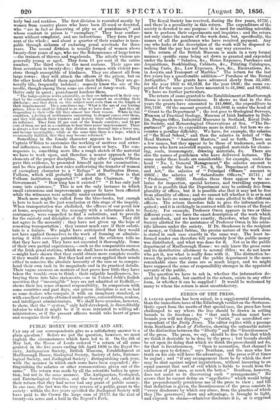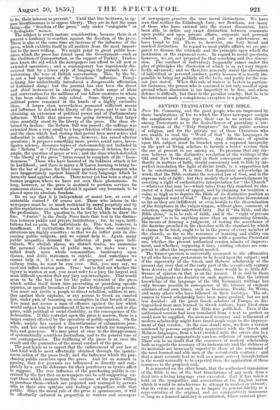ETHICS OF THE PRESS.
A LARGER. question has been raised, in a supplemental discussion, than the immediate issue of the Edinburgh verdict on the Scotsman. Quite apart from the merits of that special case, the press has been challenged to say where the line should be drawn in setting bounds to its freedom ; for "that such freedom must have bounds you will not dispute," says "Jurist," an accredited cor- respondent of the _Daily News. The editor replies with a passage from Bentham's Book of Fallacies, showing the untenable nature of the distinction between the " liberty " and the " licentiousness" of the press. The press, we say, should be free to do that which we think it desirable to be done by the press ; but bounds should be set upon its doing that which we think the press should not do, for that is licentiousness. " Open to accusation, that channel is not less open to defence," says Bentham, and the man who has truth on his side will have the advantage. The press will at times be unjust ; and "if any arrangement there be by which the door may be shut against unjust imputations, without incurring to an equal amount that sort of evil which is liable to result from the exclusion of just ones, so much the better." Bentham, however, does not assist us in discovering such " arrangements." He avows that he cannot define an " appellative " which would bring the preponderantly pernicious use of the press to view ; and till that definition is given, the licentiousness of the press consists m "every disclosure by which any abuse, from the practice of which they [the governors] draw any advantage, is brought to light, and exposed to shame—whatever disclosure it is, or is supposed to be, their interest to prevent." Until that line be drawn, to op- pose licentiousness is to oppose liberty. They are in fact the same thing—the "freedom. of the press, only under "eulogistic" or " dyslogistic " names.
The subject is worth mature consideration, because there is at present a tendency to reaction against the freedom of the press. There is also at the same time an increase of the influence of the press, which exhibits itself in all matters from the most import- ant to the most trifling. We might point to great public mea- sures which the press has forced upon the Government—such as the abolition of transportation, or the support of Turkey. Trades- men know the aid which the newspapers can afford to all new or extended operations ; and a contemporary has ingeniously dis- covered that by a lower style of language the journals are de- teriorating the tone of British conversation. This, by the by, is not a bad specimen of the "licentious" influence. Penny- a-lining has undoubtedly introduced a disagreeable affectation of Latinized slang; but the journal has also been the direct and chief instrument in elevating the whole range of ideas and conversation for the millions of our fellow creatures to whom it has been almost the only school. Some thirty years ago, political power remained in the hands of a highly: exclusive class. A larger class nevertheless possessed sufficient means and influence to defend the liberty of the press, and to use it in obtaining an extension of political power and of Parliamentary influence. While that process was going forward, that larger class manfully stood by the liberty of the press. The class ob- tained its desires : the Reform Bill was passed ; the suffrage was extended from a very small to a larger fraction of the community ; and the class which had during that period been most active and influential is satisfied. The press, however, has raised ulterior questions ; it proposes soniething more, probes social sores, inves- tigates science, discusses topics of statesmanship not included in the " Reform " or " Free-trade " programmes—it debates, for ex- ample, the question of peace or war ; and the class which defended "the liberty of the press " turns round to complain of its "licen- tiousness." Those who have boasted of its boldness attack it for its hardihood ; and there is many a li'Laren burning to bring be- fore the bar of justice for libel some printed-paper champion who uses inopportunely against himself the very language which he formerly used against others. There never yet has been a stage of human progress where we have not seen these phenomena. So long, however, as the press is destined to perform services for numerous classes, we must defend it against any trammels to be placed upon its absolute freedom.
Do we say that it is independent of moral law, or even of statutable control ? Of course not. Those who labour in the newspaper must be as much restricted by moral propriety and by police regulations as those who work in. the field, the workshop, or the professions. The question is, the test by which to draw the line. "Jurist" in the Daily News finds that test in. the distinc- tion between public and private institutions ; for' he says, insti- tutions feel no pain but individuals do. This test, however, is insufficient. If institutions feel no pain, those who sustain in- stitutions are highly sensitive ; so that we do inflict pain in dis- cussing public subjects, and we cannot help it. Again, many public necessities demand the infliction of pain upon indi- viduals. We abolish places, we disturb trades, we anatomize the personal characters of public men, we make war ; we inflict death upon whole communities, bankruptcy upon classes, and drive statesmen to suicide. And sometuues we cannot help it. If a resister of all progress will confront a railway train, he must be run over. But, you may say, we need not inflict wanton pain. True; but to find out whether the injury is wanton or not, you must refer to a jury the largest and most difficult question that any jury can investigate. That would seem to be the best law for the police restraint of the press which settles itself down into preventing or punishing specific injuries or specific breaches of the law whether public or private. You mist not invite a people to direct rebellion, soldiers to mu- tiny against their captains, or any person to break an enacted law, under pain of becoming an accomplice in that breach of law. You must not accuse a man of offences against the law which would subject him to punishment if he were convicted, and to dis- grace, with political or social disability, as the consequence of the defamation. If this restraint upon the press is narrow, there is a larger control effected by the operation of public opinion. On the whole, society has caused a discontinuance of calumnious jour- nals, and has awarded its respect to those which are temperate, fair, and generous. We may point at once to the disappearance of systematically scurrilous journalism, and to the general tone of our contemporaries. The wellbeing of the press is at once the result and the guarantee of the moral conduct of the press.
The past leads us to expect that the enforcement of any law of that kind will be most effectually obtained through the sponta- neous action of the press itself, and the influence which the pur- chasing public exercises upon the press. And let us remark in passing, that few journals are influenced so directly and com- pletely by a servile deference for their purchasers as cynics affect to suppose. The true influence of the purchasing public is ex- ercised by the fact that no newspapers can be self-supporting ex- cept those which emanate from the sections of the public willing to purchase them—which are projected and managed by persons who in their own opinions and feelings sympathize with that public. Since the moral rule of the press is spontaneous, it will be effectually enforced in proportion as writers and managers of newspapers perceive the true moral distinctions. We have seen that neither the Edinburgh Jury, nor Bentham, nor many of those who have entered into the recent discussion, have been able to define any exact distinction between comments upon public and upon private affairs, corporate and personal conduct. The single difference of pain or painlessness we have found to fail. There is, however, one very broad and marked distinction. In regard to most public affairs, we are pre- pared to discuss the rationale and the principle upon which the institution or the argument rests. In regard to social questions, however, we are not prepared for that searching and free discus- sion. The conduct of individuals frequently comes under the play of principles the discussion of which is as yet very imper- fectly advanced; and we therefore generally waive the discussion of individual or personal conduct, partly because it is nearly im- possible to bring out publicly all the facts, and partly for the rea- son just stated. When this rule of waiver is broken in particu- lar instances, the person who is censured is not only assailed upon ground where discussion is too imperfect to be free, and where defence is difficult, but there is the peculiar cruelty, that he is to his detriment made a conspicuous exception to a general law.



























 Previous page
Previous page